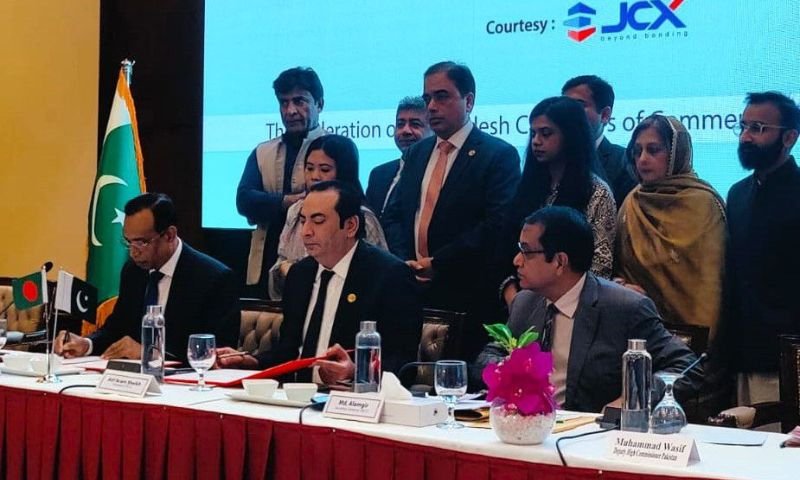ISLAMABAD, (TDI): In a landmark step toward enhancing bilateral economic ties, Pakistan and Bangladesh have launched the Pakistan-Bangladesh Joint Business Council, a collaborative initiative aimed at fostering trade and investment between the two nations.
The Memorandum of Understanding (MoU) to establish the council was signed on Monday in Dhaka by Atif Ikram Sheikh, President of the Pakistan Federation of Chambers of Commerce and Industry (FPCCI), and Muhammad Hafizur Rahman, Administrator of the Federation of Bangladesh Chambers of Commerce and Industry (FBCCI).
The signing ceremony was attended by Syed Ahmed Maroof, Pakistan’s High Commissioner to Bangladesh, who described the initiative as a significant step toward bolstering trade ties. “This platform will facilitate businesses on both sides, encourage collaboration, and strengthen bilateral trade relations,” he remarked.
Objectives of the Joint Business Council
The council will serve as a dedicated platform for sharing trade and investment information, organizing business delegations, and fostering participation in trade exhibitions in both countries.
It will also spearhead initiatives aimed at economic cooperation and mutual growth across sectors.
A Historical Overview of Trade Relations
Trade between Pakistan and Bangladesh has evolved significantly, albeit with challenges rooted in historical and political complexities since Bangladesh’s emergence as an independent state in 1971.
1980s: Efforts to normalize relations during this period were hindered by political mistrust.
1990s: Diplomatic and trade relations improved slightly, with Pakistan exporting textiles, chemicals, and machinery, while Bangladesh exported jute, tea, and agricultural products. Trade volume, however, remained modest, ranging between $50 million and $100 million annually.
Also Read: Bangladesh Eases Visa Policy for Pakistan
2000s: The early 2000s marked a turning point. Simplified trade agreements and tariff reductions helped push annual trade volumes beyond $200 million.
In 2006, the establishment of the Pakistan-Bangladesh Joint Economic Commission provided a formal platform to explore opportunities in agriculture, energy, and transport.
2010s: Bilateral trade diversified significantly. Pakistan exported textiles, rice, cement, and chemicals, while Bangladesh’s exports of ready-made garments, jute, and agricultural products increased.
Also Read: Pakistan, Bangladesh Discuss media collaboration
In 2013, a new MoU focused on improving market access and business exchanges, boosting trade volume to over $1 billion annually. By 2017-2018, bilateral trade stood at $1.2 billion to $1.3 billion.
2021-2022: Trade volumes reached approximately $1.6 billion, reflecting growing economic interdependence and a commitment to expand trade relations further.
Challenges and Opportunities
Despite progress, several challenges persist, including tariff barriers, limited direct shipping routes, and occasional political tensions.
However, ongoing efforts to enhance people-to-people contact, expand trade agreements, and improve logistical connectivity underscore the shared commitment to overcoming these hurdles.
The formation of the Pakistan-Bangladesh Joint Business Council represents a pivotal moment in the relationship between the two nations.
By focusing on shared economic interests, this initiative aims to unlock the full potential of bilateral trade and investment, paving the way for a future of mutual growth and cooperation.



